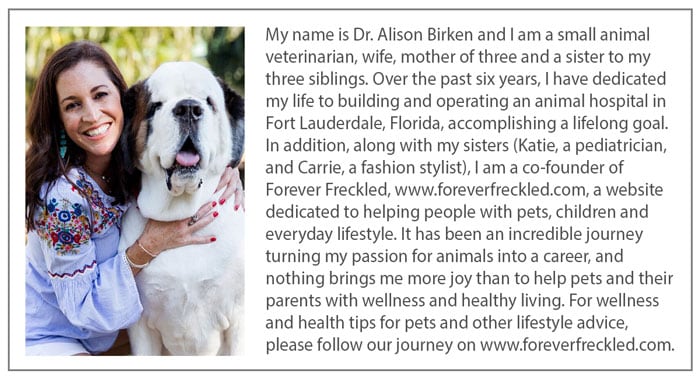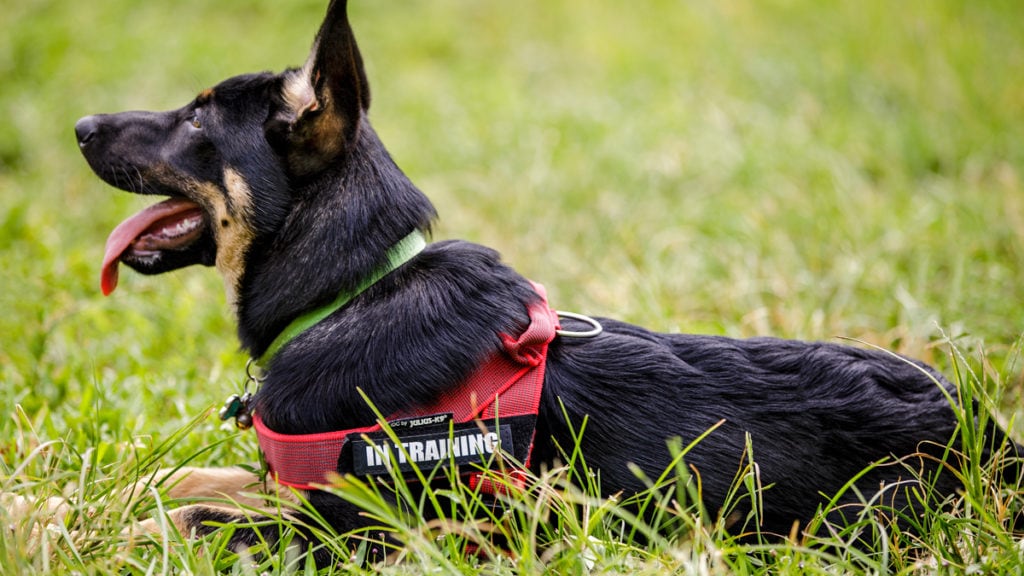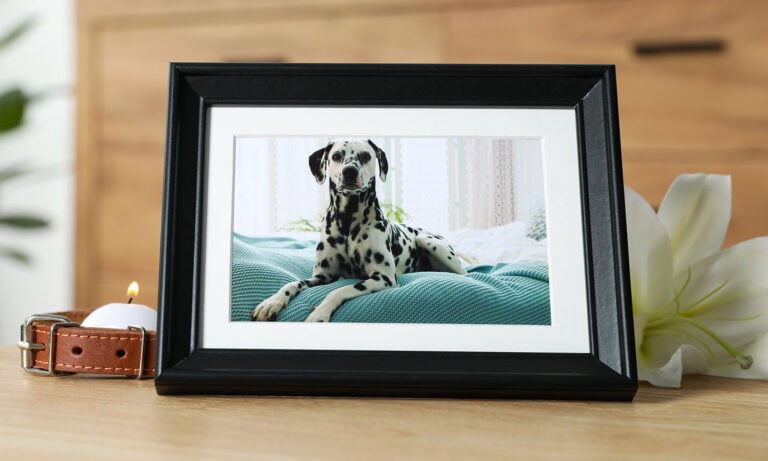Contributed by Dr. Alison Birken, owner and DVM of Victoria Park Animal Hospital.
We all know the emotional benefits of owning or being around a dog—happiness, love, security and comfort. But studies show there are significant health benefits as well. There is no doubt that dogs are very special beings. They give back to us unfaltering love, affection, compassion, devotion, dedication and a sense of family. With all these amazing attributes, it is only natural that dogs are becoming more and more useful for therapy and rehabilitation for humans. As a veterinarian, I evaluate and sign paperwork for a lot of therapy dogs. Nothing brings me more joy than to see the love and devotion that dogs bring to their parents, especially to people in need. So how do dogs become therapy dogs, and what can you do to become a part of dog therapy—an amazing and rewarding service for your community? Today I would like to take a moment to discuss the basics on how your dog can become a therapy dog.
What is dog therapy?
Therapy dogs and their owners become volunteers who visit hospitals, schools, hospice, nursing homes, libraries, shelters, disaster areas and other places where dogs are asked to provide comfort, affection, love and happiness to people in need.
What requirements are needed to become a therapy dog?
• AKC (American Kennel Club) Therapy Dog Title. In order for your dog to receive the AKC Therapy Dog Title, they must be certified by a National Therapy Dog Registration/Certification Organization. The following is a link to all the National Therapy Dog Registration/Certification Organizations that are recognized by the AKC: http://www.akc.org/events/title-recognition-program/therapy/organizations.
How does my pet receive an AKC Therapy Dog Title?
• Register your dog for one of the National Therapy Dog Registration/Certification organizations. Your dog will be required to pass a test for approval to become a therapy dog.
• Once you choose a therapy dog organization that is AKC recognized, contact them to inquire about testing fees, testing dates and testing requirements.
• Know where you want to volunteer. Contact the volunteer site and ask if they require a particular title from a specific therapy dog organization. Ask the volunteer site what paperwork is required for the handler. Sometimes your volunteer site will conduct background checks, and require proof of flu shots and immunizations.
• Once your dog successfully completes the test, you will be provided with documents for submission to the organization you have chosen. Many organizations require a yearly health certificate from your veterinarian and yearly dues. Be prepared to submit a picture of your dog for the identification card.
• When you receive your dog’s ID, and the handler is cleared to volunteer at the site, prepare your dog for the visits. The dog should be well-groomed and fed, and a designated pet relief area should be visited prior to entering the volunteer site. You may want to start with short visits until you and your dog become acclimated.
How do I prepare my dog to pass the AKC Therapy Dog test?
Socialize your friendly dog/puppy to different environments, crowds of people, noises and surroundings.
• As a puppy, introduce your dog to outdoor dining, noisy environments, crowded places, new people and other dogs. Don’t allow them to jump on people, receive food from the table or lick people.
• Enroll your dog in training classes and notify your trainer of your therapy dog goals. Know the testing requirements in order to train your dog to meet the necessary testing requirements.
• Begin training as early as possible. Successful execution of the following training commands are essential: sit, stay, down and leave it. Training your dog to walk on your left side with a loose leash is required with most therapy dog organizations. If your future therapy dog is going to have two handlers, it is important that both handlers participate in training. Before your dog takes the exam, training should be taught without providing treats as a reward.
• With most therapy dog organizations, testing cannot be scheduled unless your dog is a minimum age of 1 year. It’s crucial for you to be honest and know if your dog is truly ready to become a therapy dog.
• On the day of the test, relax. Be prepared to spend a few hours at the test site since several dogs will be tested at the same time. Your dog should be prepared to avoid tempting foods on floors and tables, avoid becoming startled near crutches and wheelchairs, sit and stay while the handler is out of sight for at least 3 minutes, walk on a loose leash without training collars or training leashes, and avoid distractions when given stay and down commands.
Where can we go to deliver dog therapy?
Therapy dogs can go wherever they are requested to provide comfort and affection. The most common places that invite therapy dogs into their facilities are:
• Hospitals
• Schools
• Hospice
• Nursing homes
• Libraries
• Shelters
• Disaster areas
Nothing is more rewarding and satisfying than seeing your dog bring comfort and love to those in need with their own special kind of dog therapy. Dogs exemplify true and selfless love, and giving that back to people in need is what life is all about.

Share:









